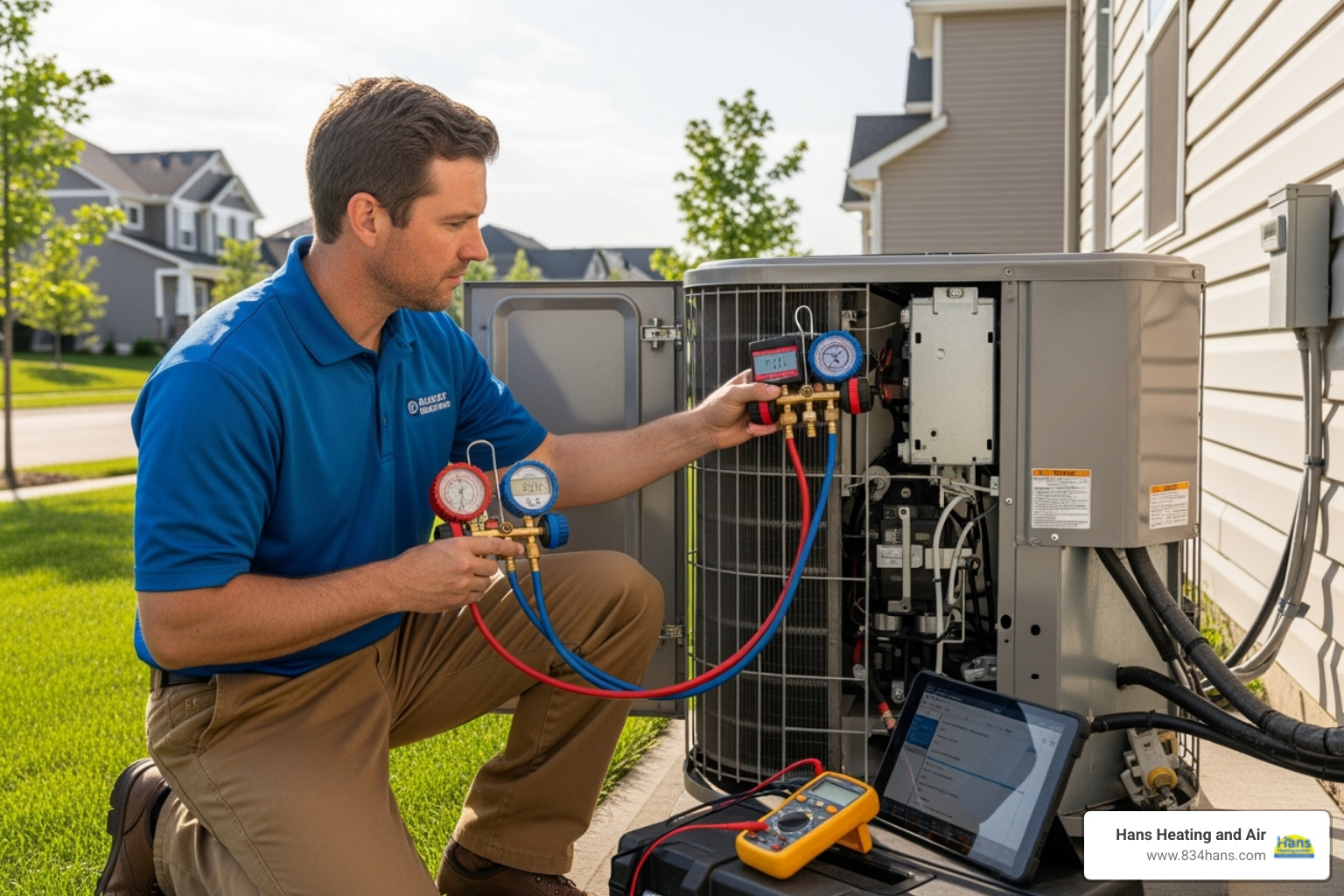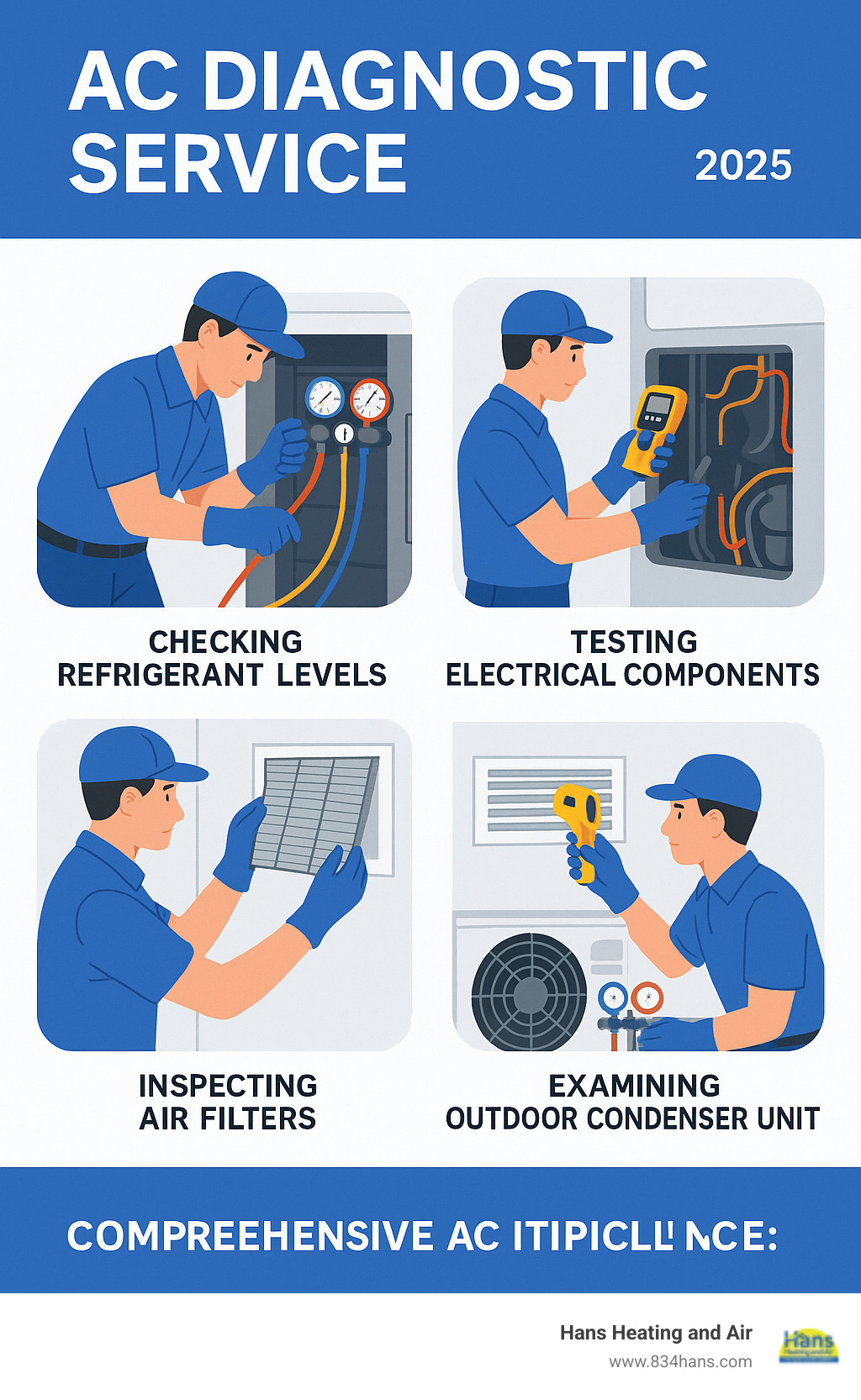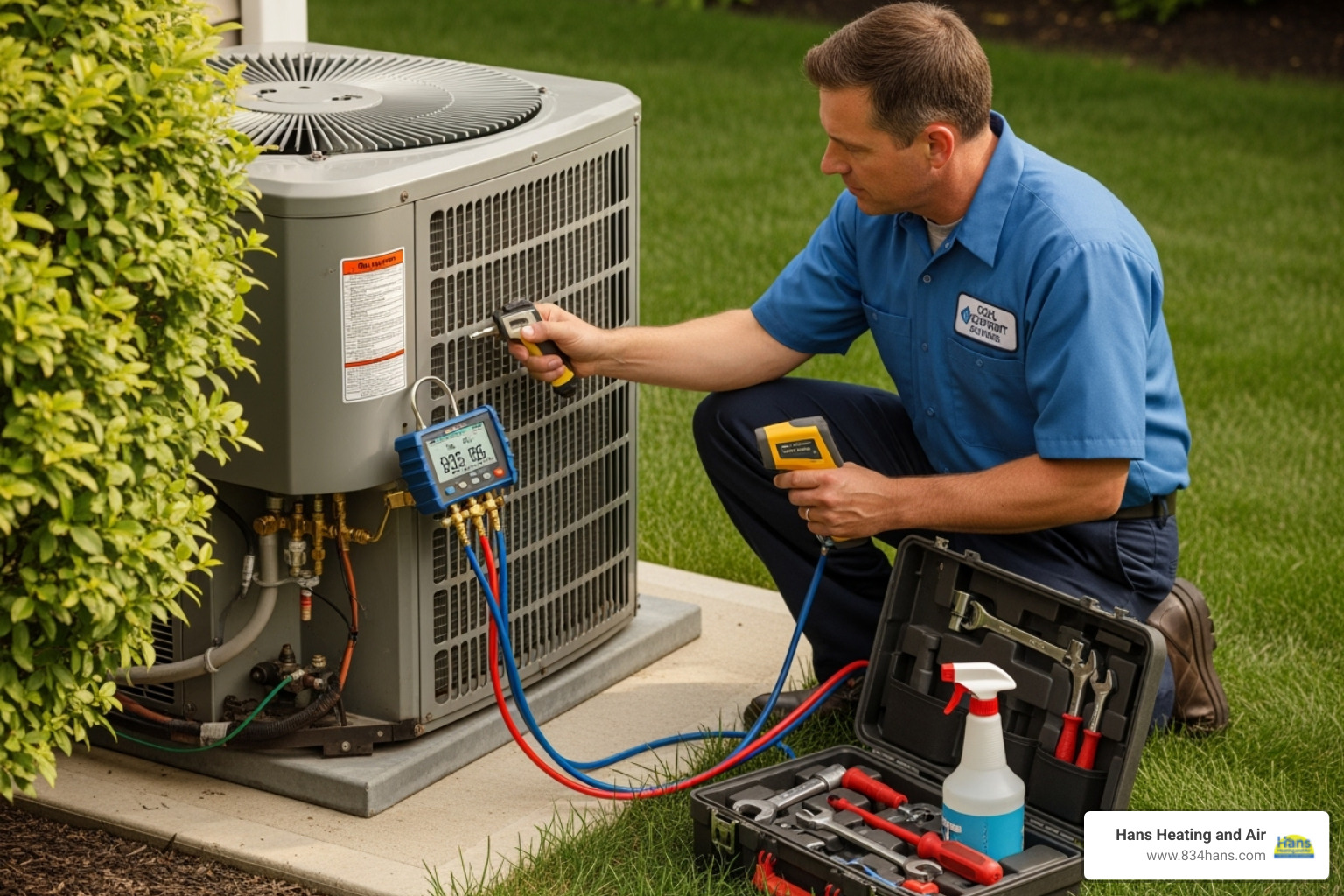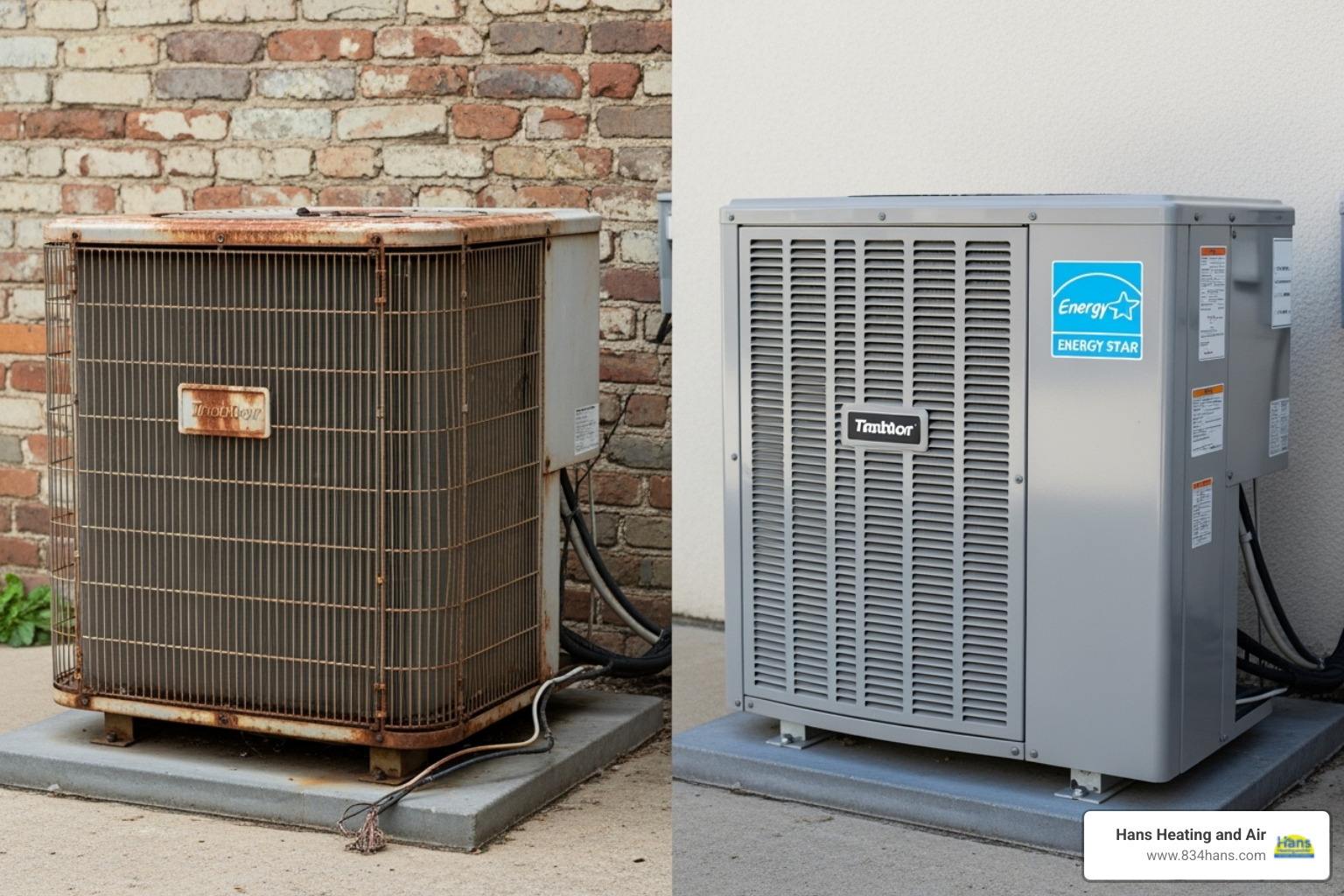Don't Sweat It: Understanding Your AC Performance Check
Why Your AC System Needs Professional Attention

An AC diagnostic service is a comprehensive inspection that identifies problems with your air conditioning system before they become costly repairs or complete breakdowns. Professional technicians use specialized tools to check refrigerant levels, electrical components, and system performance to ensure your AC runs efficiently.
What an AC diagnostic service typically includes:
- Visual inspection of all system components
- Refrigerant level and pressure checks to detect leaks
- Electrical component testing including capacitors and contactors
- Thermostat calibration and functionality testing
- Condensate drain line inspection to prevent water damage
- Compressor and blower motor evaluation for proper operation
- Complete system performance analysis with temperature readings
The last thing you need on a hot summer afternoon is for your air conditioner to stop working. When your AC starts blowing warm air, making strange noises, or cycling on and off repeatedly, these are clear warning signs that something's wrong.
Many homeowners wait until their system completely fails before calling for help. But here's the thing - catching problems early through professional diagnostics can save you hundreds of dollars and prevent those uncomfortable emergency situations when your family needs cooling the most.
A professional diagnostic service goes far beyond what you can check yourself. While you might notice weak airflow or unusual sounds, trained technicians use specialized equipment to measure system pressures, test electrical components, and identify issues that aren't visible to the untrained eye.

Telltale Signs Your AC is Crying for Help
Your air conditioning system has its own way of asking for help - you just need to know what to listen for. Think of these warning signs as your AC's way of waving a little white flag before things get really uncomfortable (and expensive).
Weak airflow is often the first hint that something's not quite right. When you hold your hand up to a vent and feel more of a gentle whisper than a cool breeze, your system is struggling. This could mean a clogged air filter, a failing blower motor, or blocked ductwork that's choking your system's ability to circulate air properly.
Warm air blowing from your vents is probably the most obvious cry for help. When your AC is pushing out lukewarm or downright warm air instead of that refreshing coolness you're expecting, it's usually pointing to low refrigerant levels, a malfunctioning compressor, or a clogged condenser that needs immediate attention.
Your ears can be excellent diagnostic tools too. Strange noises are your AC's way of telling you something mechanical is going wrong. A healthy system should hum along quietly in the background, not announce its presence with alarming sounds.
Unusual sounds to listen for:
- Grinding - often means compressor bearings or internal mechanical parts are wearing out
- Squealing - typically indicates worn belts or failing motor bearings
- Clanging - suggests loose parts rattling around, like a fan blade hitting something it shouldn't
- Hissing or bubbling - could signal a refrigerant leak that needs immediate professional attention
Odd smells coming from your vents are another red flag. A persistent musty or moldy odor usually means mold or mildew is growing in your evaporator coil or drain pan. A burning smell could indicate electrical problems or an overheating motor. If you notice a sweet, chemical-like smell, that might be refrigerant leaking - definitely time to call for help.
Water leaks around your indoor unit aren't normal, despite what some people think. While a tiny bit of condensation is expected, actual puddles or active dripping usually means you have a clogged condensate drain line or possibly a frozen evaporator coil that's now thawing out.
High humidity in your home, even with the AC running, is another telltale sign. Your air conditioner doesn't just cool your home - it also removes moisture from the air. When your house feels sticky and muggy despite the AC working, your system isn't dehumidifying properly.
Rising energy bills without any change in your usage habits often indicate your AC is working overtime to maintain comfortable temperatures. This inefficiency can stem from various issues, from dirty coils to refrigerant problems to a failing compressor.
Short cycling - when your AC turns on, runs briefly, then shuts off only to repeat this cycle over and over - is particularly hard on your system. This constant stop-and-start pattern wastes energy and puts unnecessary stress on components, often indicating problems like refrigerant leaks or electrical issues.
If you're noticing any of these warning signs, don't wait for a complete breakdown. Getting an AC diagnostic service early can save you from sweltering summer days and much larger repair bills down the road.
Your Pre-Call Checklist: Basic AC Troubleshooting
Before you reach for the phone to schedule an AC diagnostic service, take a few minutes to run through some simple checks. You might be surprised how often these basic steps solve the problem entirely! Even if they don't fix everything, walking through this checklist will help our technicians understand your situation better when you do call.
Start with your thermostat settings - it sounds almost too simple, but you'd be amazed how often this is the culprit. Make sure it's actually set to "COOL" and that your target temperature is at least a few degrees below the current room temperature. While you're at it, check if your thermostat uses batteries and swap them out if they're getting weak. A sluggish thermostat can make your whole system act up.
Next, check your circuit breaker at your main electrical panel. Look for the breaker that controls your AC unit - it might be labeled "AC," "Air Conditioner," or "Outdoor Unit." If it's tripped (sitting halfway between "on" and "off"), flip it completely off first, then back on. If it trips again right away, that's a sign of an electrical issue that needs professional attention.
Your air filter deserves special attention because it's often the root of many AC problems. A clogged filter blocks airflow, forcing your system to work overtime and potentially causing the evaporator coil to freeze up. Pull it out and hold it up to the light - if you can't see through it clearly, it needs cleaning or replacing. This simple maintenance step can prevent a lot of headaches down the road.
Take a walk around your home and make sure all your vents are open and unobstructed. Sometimes furniture gets moved, curtains get rearranged, or boxes get stacked in front of vents without anyone thinking about it. Your AC system needs that airflow to work properly, so clear any blocked vents you find.
Don't forget about your outdoor unit - it needs breathing room too. Check around your condenser for leaves, grass clippings, dirt buildup, or plants that might have grown too close. Your outdoor unit should have at least two feet of clear space all around it for proper airflow. A quick cleanup out there can make a real difference in how efficiently your system runs.
If these simple fixes don't solve your problem, or if you're dealing with more serious symptoms like strange noises or water leaks, it's time to call Hans Heating and Air for a professional evaluation. These basic checks are great for catching the easy stuff, but some issues need the expertise and specialized tools that come with a thorough diagnostic service.
Inside a Professional AC Diagnostic Service
When you call Hans Heating and Air for an AC diagnostic service, you're getting more than just a quick look at your system. Our experienced technicians arrive with specialized equipment and years of training to solve the mystery of what's making your AC act up.

Think of it like taking your car to a mechanic when it's making that weird noise you can't quite describe. Except instead of popping the hood, we're examining every part of your cooling system to figure out exactly what's wrong.
Our visual inspection comes first - we examine your entire system from top to bottom, inside and out. We're looking for obvious problems like damaged coils, corroded wiring, or that family of leaves that decided to make your outdoor unit their new home. Sometimes the problem is hiding in plain sight.
Checking refrigerant levels and pressure is where our specialized tools really shine. Your AC system is sealed, so if refrigerant is low, there's definitely a leak somewhere. We connect pressure gauges to get precise readings and may even use fluorescent dye to track down sneaky leaks that aren't obvious to the naked eye.
The electrical component testing is where things get technical. We test your capacitors (they're like the starter motor for your AC), contactors that switch power to major components, and all the wiring and fuses. A failing capacitor is one of the most common reasons an AC won't start - it's like having a dead battery in your car.
Your compressor gets special attention because it's the heart of your cooling system. We listen to how it sounds, check its electrical draw, and make sure it's doing its job properly. Since compressors are expensive to replace, we're thorough about diagnosing any issues early.
Thermostat calibration ensures your system is getting the right signals. If your thermostat thinks it's 75 degrees when it's actually 80, your AC won't cool properly no matter how hard it tries.
We also inspect your condensate drain line because a clogged drain can cause water to back up and damage your home. Nobody wants to find a puddle around their indoor unit on a hot summer day.
Finally, we do a complete performance analysis by taking temperature readings at your vents and comparing them to the ambient conditions. This tells us how efficiently your system is actually cooling your home.
What Technicians Look For
During our diagnostic process, we're detective work looking for the usual suspects. Faulty capacitors top the list - they're responsible for many "my AC won't start" calls. Refrigerant leaks are another common culprit, especially in older systems.
Clogged drain lines might seem minor, but they can cause major water damage if left unchecked. Electrical failures range from simple tripped breakers to more complex wiring issues that prevent your system from running safely.
We also check for worn contactors that can cause your system to run intermittently, compressor issues that affect your system's ability to cool, and blower motor problems that result in weak airflow throughout your home.
Understanding the Cost of an AC Diagnostic Service
When you schedule an AC diagnostic service with us, you'll pay a diagnostic fee that covers our technician's time and expertise to thoroughly examine your system. Think of it as an investment in getting the right answer the first time, rather than guessing at what might be wrong.
We believe in transparency, so you'll get an upfront quote for any recommended repairs before we start any work. No surprises, no hidden fees - just honest recommendations based on what we find during our inspection.
Many times, if you decide to move forward with our recommended repairs, we'll apply the diagnostic fee toward your total repair cost. We want to fix your problem, not add to your stress about unexpected expenses.
The best part? Once we identify the issue, we can often fix many common problems on the same visit. That means you get back to enjoying comfortable temperatures in your home without waiting for another appointment.
Repair, Replace, or Maintain? Making the Right Call
After a thorough AC diagnostic service, you'll likely find yourself at a crossroads. Should you repair your current system, invest in a brand new unit, or focus on better maintenance? It's one of those decisions that can feel overwhelming, but don't worry - we've helped countless homeowners steer this exact situation.

The truth is, there's no one-size-fits-all answer. Every situation is unique, and what makes sense for your neighbor might not be the best choice for you. That's why we take the time to walk you through all the factors that should influence your decision.
Repair vs. Replacement: Key Factors to Consider
When we complete your AC diagnostic service and present you with repair options, several key factors will help guide your decision. Think of it like deciding whether to fix your old car or buy a new one - the same logic applies to your cooling system.
Unit age is often the first thing we consider together. Most air conditioners have a lifespan of 10 to 15 years with proper care. If your system is pushing past that decade mark and needs a major repair, replacement often makes more financial sense. Newer units are simply more efficient and reliable than older ones struggling to keep up.
The repair cost itself tells an important story. We follow what's called the 50% rule - if fixing your current system costs half or more than what you'd spend on a new unit, investing in replacement usually wins out. This becomes even more true when your system has some age on it.
Here's something many homeowners don't realize: the type of refrigerant your system uses can make or break the repair decision. Older units often rely on R-22 refrigerant, which has been phased out for environmental reasons according to EPA regulations. If your R-22 system has a leak, the refrigerant itself can cost more than you'd expect, making replacement the smarter long-term investment.
Frequency of breakdowns is another red flag we watch for. If you've been calling us multiple times each season, your AC is basically telling you it's ready to retire. Those repair bills add up quickly, and you deserve reliable comfort without constantly worrying about the next breakdown.
System efficiency affects your wallet every month through your energy bills. Older systems work harder to achieve the same cooling, which means higher utility costs. A new, efficient unit often pays for itself over time through energy savings alone. The Department of Energy notes that today's best air conditioners use 30% to 50% less energy than units made in the mid-1970s.
The Power of Prevention: Your Guide to a Professional AC Diagnostic Service
Sometimes the best decision isn't repair or replacement - it's prevention. Regular AC diagnostic service and maintenance can transform how your system performs and how long it lasts. Think of it as healthcare for your HVAC system.
Longevity improves dramatically with consistent care. We've seen well-maintained systems run reliably for 15 years or more, while neglected units fail after just 8 or 10 years. That's several extra years of comfort without the expense of replacement.
Efficiency stays high when your system gets regular attention. Clean coils, proper refrigerant levels, and well-lubricated parts all contribute to smooth operation that doesn't waste energy. Your monthly bills will thank you.
Cost savings happen in two ways - you avoid expensive emergency repairs, and your system uses less energy to keep you comfortable. Regular AC maintenance can prevent refrigerant leaks and compressor damage, which are among the most costly repairs we see.
Improved air quality is a bonus many people don't expect. A clean, properly functioning system filters dust more effectively and controls humidity better, creating a healthier environment for your family.
Peace of mind might be the most valuable benefit of all. When you know your system has been professionally inspected and maintained, you can relax and enjoy your comfort without worrying about surprise breakdowns during the hottest days of summer.
Why Regular Maintenance is Crucial for Your AC System
We like to compare AC maintenance to getting regular oil changes for your car. Both are small investments that prevent much larger problems down the road.
Preventing breakdowns is maintenance's biggest advantage. Most major AC failures start as small issues that could have been caught and fixed during routine service. A loose electrical connection or slightly low refrigerant level can turn into a complete system failure if left unchecked.
Ensuring peak performance means your system cools efficiently and consistently. When all components are clean and properly adjusted, your AC doesn't have to work overtime to maintain comfortable temperatures.
Extending equipment lifespan translates directly into value for your investment. The typical useful life for an air conditioner with proper maintenance is approximately 10 to 15 years, but neglected systems often fail much sooner.
Lowering utility bills happens naturally when your system runs efficiently. Clean coils transfer heat better, proper refrigerant levels ensure optimal cooling, and well-maintained motors use less electricity.
Maintaining warranty protection is something many homeowners overlook. Most manufacturers require annual professional maintenance to keep your warranty valid. Skipping maintenance could void your coverage right when you need it most.
At Hans Heating and Air, we're here to help you make the right decision for your specific situation. Whether that's a simple repair, a new system installation, or a comprehensive maintenance plan, we'll provide honest guidance based on what's truly best for your comfort and budget.
Frequently Asked Questions about AC Diagnostics
When it comes to AC diagnostic service, we hear the same questions time and again from homeowners just like you. Let's tackle the most common ones to help you feel confident about caring for your cooling system.
How often should I get my AC system inspected?
Here's the simple truth: your AC system needs professional attention at least once a year. Think of it like your annual doctor's visit - it's all about catching small issues before they become big problems.
The sweet spot for scheduling your AC diagnostic service is in the spring, ideally before you really need to crank up the cooling. This timing gives us a chance to spot any winter damage, replace worn parts, and make sure everything's running smoothly before the summer heat hits.
Consistency is key when it comes to AC inspections. Regular pre-season check-ups don't just prevent those dreaded middle-of-July breakdowns - they also help your system run more efficiently all season long. If you notice signs like weak cooling or unusual sounds between annual visits, don't wait. Give us a call right away.
What is the typical lifespan of an air conditioner?
Most air conditioners live a good, productive life of 10 to 15 years when they're properly cared for. But here's the thing - that number isn't set in stone.
Your AC's lifespan depends on several factors that are largely within your control. Quality installation matters tremendously from day one. A system that's properly sized and correctly installed will always outlast one that isn't.
Climate plays a role too. If you live somewhere that puts your AC through its paces for months on end, it might not last quite as long as one in a milder climate. But the biggest factor by far is maintenance.
Units that receive regular professional care consistently reach or exceed that 15-year mark. On the flip side, neglected systems often start having serious problems around the 8-10 year point. It's really that simple - a little attention goes a long way.
Can I perform a full AC diagnostic myself?
We absolutely love that you want to take care of your system! Basic troubleshooting like checking your thermostat settings, replacing air filters, and making sure vents aren't blocked - these are all great things you can and should do.
But when it comes to a comprehensive AC diagnostic service, that's where you'll want to step back and let the professionals handle it. Here's why: professional diagnostics require specialized tools that most homeowners don't have access to. We're talking about refrigerant gauges, electrical meters, leak detection equipment, and pressure testing devices.
Safety is our biggest concern. AC systems involve high-voltage electricity and pressurized refrigerants that can be dangerous without proper training. Even something as simple as checking refrigerant levels requires handling chemicals that need special certification.
There's also the risk of causing more damage than you solve. Licensed technicians know exactly what to look for and how to test components without damaging them. We've seen well-meaning DIY attempts turn minor issues into major repair bills.
Trust us - we want you to be involved in caring for your system. But for the complex stuff, let our experienced team handle the heavy lifting while you enjoy the peace of mind that comes with professional service.
Conclusion
Your air conditioner works hard to keep you comfortable, and it deserves some attention in return. When you notice those telltale signs - whether it's weak airflow, strange noises, or rising energy bills - your system is simply asking for help. The good news? Most problems are completely manageable when caught early through a professional AC diagnostic service.
Think of it this way: you wouldn't ignore a strange noise from your car's engine, so why wait when your AC starts acting up? Those seemingly minor issues have a way of turning into major headaches (and major expenses) if left unchecked.
The beauty of proactive maintenance lies in its simplicity. One annual inspection can save you from sweltering summer days without cooling, unexpected repair bills, and the stress of emergency breakdowns. Plus, a well-maintained system runs more efficiently, which means lower energy bills and better performance when you need it most.
At Hans Heating and Air, we've seen it all - from simple filter changes that restored perfect airflow to complex diagnostics that prevented complete system failures. Our goal is always to keep your family comfortable while protecting your investment in your HVAC system.
Don't wait until you're sweating to call for help! Regular maintenance and timely diagnostics are your best defense against unexpected breakdowns. When you stay ahead of problems, everyone wins - your family stays comfortable, your wallet stays happy, and your AC system keeps running smoothly for years to come.
Your HVAC needs extend beyond just cooling. Ensure your entire HVAC system is ready for any season with comprehensive maintenance that covers heating, cooling, and everything in between. Because comfort shouldn't be seasonal - it should be year-round.
Other Services
Community Involvement
























